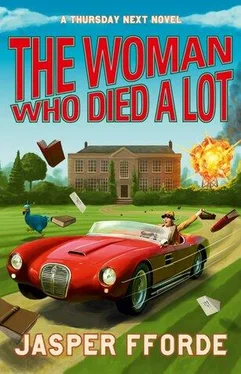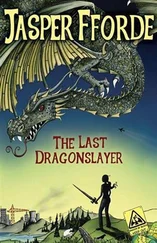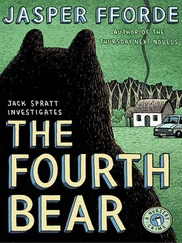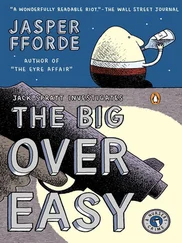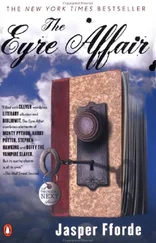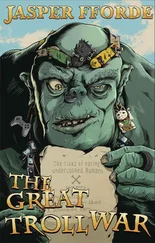“I’m sorry to hear that,” I said, musing on the misguided wisdom that allowed ex–potential employees to have both their original and new lives summarized in a paragraph or two. It was dubbed the “Letter of Destiny” and was apparently part of the Union of Federated Timeworkers severance package. The unions were powerful but had achingly slow bureaucracy. Despite the time engines’ being shut down over two years ago, the Letters of Destiny were only just falling through people’s mailboxes. To many they came as a complete surprise and met with mixed feelings. Yes, it was good to know you might have been a hero at ChronoGuard, and yes, it was good to know that you make it to fifty-one without losing your mind or your hair, but no, perhaps you could do without knowing that your wife/husband is going to sleep with your best friend and enjoy it more, and no, it’s not healthy to know that you’re going to have an arm torn off by a gorilla in six hours and there’s nothing you can do about it.
“You would have known my son,” I said. “Friday Next.”
“Ooh,” she said, eyes opening a bit wider at the mention of his name, “I’d have left my husband for him. We’d have spent a sweaty weekend consummating our affair in his Late Pleistocene weekend retreat.”
This was news to me, and I wasn’t happy knowing that my son might once—in an alternative future—be sleeping with another man’s wife. There was the ethical question of second homes, too.
“I never knew he would’ve had a holiday home in the Late Pleistocene.”
“One interglacial back so with good weather, nothing too bitey and only twelve thousand years ago, so easy access for Friday afternoons—the time engines would have gotten really clogged as soon as work ended.”
“If you must have a second home, best have it someplace where it doesn’t inflate house prices,” I mused. “Have you met him in this timeline?”
“No. I only got my Letter of Destiny last week.”
“Are you okay about it?” I asked, as my son Friday had also been summarized recently and was being a bit more reticent as to how it turned out for him.
“I’m fine about it,” she said cheerily. “Before, I suspected I might not amount to anything, and now I know I won’t, so at least it takes away the wearisome burden of delusive hope.”
“Very . . . philosophical of you.”
She thought for a moment.
“Will you tell Friday that Shazza says, ‘It would have been seriously good’?”
My son and father would both have been in the ChronoGuard if the engines hadn’t been switched off, so the seemingly pointless discussions on the might-have-been were not exactly relevant but certainly of interest.
I told her I’d pass on her message, and she gave a half smile before returning to her nails and bag of M&M’s.
The door to Dr. Chumley’s office opened, and a short, heavyset man walked out. He had prominent brow ridges, dark eyes, and a broad nose. He wore a well-tailored suit woven from three different colors of baling twine, and his head was topped by a shock of unruly hair that had violently resisted all attempts to be combed. When he moved, he had the side-to-side gait of a sailor, and the smell of woodsmoke and hot mud moved with him. This was not at all unusual. He was a resequenced neanderthal named Stiggins and soon to be, I assumed, divisional head of SO-13, the department that policed all unextincted creatures. Not just the legal ones like mammoths, dodos, saber-toothed tigers and himself but also all the ones that were illegal— Diatrymas, to list an example never far from the news, and a host of chimeras—creatures that had sprung not from the random machinations of evolution but from garden-shed laboratories of meddling hobby geneticists who should have known better.
“Hello, Stig.”
He gave a snorty grunt of pleasure, and we hugged and smelled each other—once in the armpit, once in the hair, as was the neanderthal custom.
“ Co-op generic shampoo,” he said with a grimace, the ’thal version of a smile, “but stored in a Pantene container.”
“I like the shape of the bottle.”
“Us, too. Bacon and eggs for breakfast with arabica coffee, pushy-down, not bubble-bubble. Toast with jam. Raspberry. You travel Skyrail, sit next to someone too much Bodmin aftershave, and I smell much-much painkiller, Dizuperadol patches, two per cheek.” He took another deep breath. “But no oofy-oofy with husband. Not for weeks. Not like you. Problems?”
“I’m still a bit mashed,” I replied with a smile, well used to neanderthal ways, which were dazzlingly direct and unencumbered by the complex peculiarities of human etiquette, “but thanks for the concern.”
“Oofy-oofy very important.”
“I’ll second that,” I said with a sigh. “I’d like to but have no desire to. How are Felicity and the boys?”
“We are all well, thank you. Mrs. Stiggins is ripe at present, and the boys passed their flint-plus with distinction.”
“You must send them our congratulations.”
“We shall. And your own childer, Thursday?”
“They’re well, mostly. Friday still doesn’t have a purpose since his future was erased, and Tuesday is going to be the keynote speaker at the annual Mad Inventors Convention on Thursday. Jenny keeps herself to herself most of the time. When do you restart SO-13?”
“We start now. But work no different to past thirteen years. Just legal and paid—end to beetle soup, leaky roof, and sixteenmile walk to work. Afford bus.” And he gave another grunty laugh. “But why?” he added.
“Why what?”
“Why SpecOps back? Something change?”
“I don’t know,” I confessed, “I’m seeing Braxton later. I’ll ask him.”
“Detective Next?” said the receptionist, having finally decided to answer the plaintively wailing intercom, “Dr. Chumley will see you now.”
I wished Stig good day and walked past the receptionist, who had reverted to her bleached hair and modern dress. I took a deep breath, knocked on the door and—when I heard a muffled “enter!”—walked in.
The somewhat bizarre nature of SpecOps work and the high level of stressrelated retirements led SpecOps management to undertake a top-down psychological overhaul as early as 1952, when a stringent psychological appraisal of all personnel revealed that few, if any, were completely free of work-related mental issues. Before the entire service was retired, it was discovered that a control sample of ordinary citizens were probably just as mad as those in SpecOps and that the “ordinary” classification was simply set unrealistically high. Once that had been adjusted accordingly, the matter was resolved to the satisfaction of everyone.
Dr. Franz Egg,
The effect of SpecOps work on the human psyche, its possible ramifications to a healthy life and comments upon needlessly long titles to academic reports
Dr. Chumley was turned away from me when I entered and seemed to be leaning on the filing cabinet for support while his back moved in that way it does when people are silently sobbing.
“Are you okay?” I asked.
“Never better,” he replied, his voice with a forced quietness— like you reset when someone steps on your toe with a baby asleep nearby. “Are you here to talk about issues regarding your work as a serving SpecOps officer?”
“No,” I replied, “I’m here for a psychiatric evaluation at Commander Braxton Hicks’s behest.”
“Thank God for that,” he said with obvious relief. “I thought I’d have to listen to the crazy antics of some deranged operative who should have been straitjacketed long ago.”
Читать дальше
